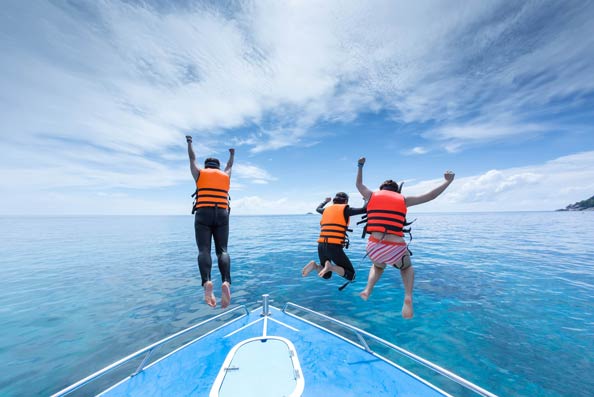Whether you’re padding down the Potomac River or charting a course in the Chesapeake Bay, you’ll want to make sure you’ve taken the necessary precautions to be safe during the spring and summer season. That’s why Long & Foster Insurance, a leading independent insurance agency that represents many of the nation’s top rated insurance companies, and Travelers, a leading provider of boat and yacht insurance, have put together the following list of boat safety tips.
- Wear a life jacket: About 80 percent of drowning victims were not wearing a personal flotation device (PFD) or life jacket. Most states require that kids under a certain age wear a life jacket and that every boat be equipped with one life jacket per passenger.
- Take a boating course: Even if your state does not mandate the completion of a boating course before obtaining your boating license, both you and your passengers will benefit from a formalized course. To learn more about boating safety classes, visit http://cgaux.org/boatinged.
- Schedule a vessel safety check: The Coast Guard auxiliary offers free safety checks. For more information, visit www.vesselsafetycheck.org/getvsc or http://www.uscgboating.org/default.aspx.
- Equip your boat with an emergency kit and be familiar with how to use each of the items. Remember to test equipment and be knowledgeable of the suggested guidelines for usage and replacement. Travelers recommends including the following in your emergency kit:
- Fire extinguisher
- First aid kit
- Visual distress signal and/or a Coast Guard-approved throwable PFD, such as a life ring or a horseshoe.
- Be prepared for the weather: Check the weather forecast before going on the water and be equipped for changes.
- Know where you are: The Coast Guard recommends having charts, a GPS (Global Positioning System) and a reliable means of communication on board.
- Know how to contact the Coast Guard: Marine radio is the preferred method to communicate on the water because it broadcasts to other boaters in the vicinity. If using a cell phone on the water, test it for a maritime emergency by dialing *CG (*24). There is no charge or penalty for calling to test the signal.
- Do not drink and drive: According to the Coast Guard, a boat operator with a blood alcohol level of 0.10 percent is 10 times more likely to be killed in a boating accident than a boat operator with a blood alcohol level of zero. Operating a boat while drinking is illegal in several states. Remember that the effects of alcohol are exacerbated when combined with sun exposure and being on the water.
“Substantially more people are on the water during the spring and summer, so that is the time boaters should be extra careful to protect their family, friends and watercraft from a loss,” said Patrick Bain, president of Long & Foster Insurance. “It’s also a good time to review your boat and yacht insurance with an independent agent to be sure you have adequate coverage.”
For more information, visit www.longandfoster.com/insurance.
